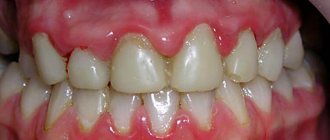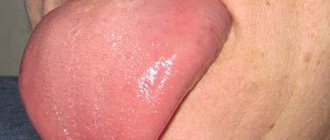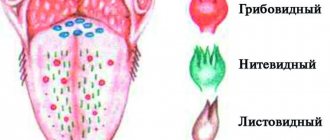The tongue has several functions in our bodies. There are thousands of taste buds on its surface, thanks to which we recognize the taste and aroma of food. But above all, it is a strong muscle with which we can speak and swallow. A healthy tongue is pink, almost smooth and elastic, and touching it should not cause pain. But if something is wrong in the body, the appearance of this muscle also changes.
What can you tell by the appearance of your tongue?
In traditional medicine, the phrase: “Show your tongue!” is usually said by a therapist and an otolaryngologist who want to examine a patient’s throat. But in Chinese traditional medicine, for more than a millennium, doctors have been diagnosing a person’s health condition by his tongue. But for maximum accuracy of diagnosis, it is recommended to examine the muscle in the morning, in good lighting, and preferably before eating and brushing your teeth.
It is interesting that even before examining the pattern on the surface of the organ, experts even pay attention to how the patient opens his mouth.
Content:
- What can you tell by the appearance of your tongue?
- Surface structure
- Color
- Plaque and possible diseases
- If your tongue hurts or burns
- What does tongue size tell you?
- What about your taste buds?
- Effect of medications on the appearance of the tongue
For example, if a person does this timidly and shows only part of his tongue, as if embarrassed, to Chinese healers this fact indicates a lack of vitality. If the patient sticks out his tongue, tilting its tip to one side, this can be perceived as a signal that there are problems on that side of the body.
According to Eastern medicine, any changes in individual parts of the organ are not an accident. The Chinese even developed a map of the relationship between individual parts of the tongue and internal organs. So, according to this theory, the language is usually divided into 5 functional zones.
Tip
This part is a “mirror” of the state of organs such as the heart and small intestine. In addition, redness on the tip of the tongue or bright spots on it may indicate anxiety or stress.
Piece by tip
By studying the state of this zone, we can draw a conclusion about the normal functioning of the respiratory and immune systems. Changes in this area may indicate bronchitis, tuberculosis, pneumonia or emphysema.
Center
The middle part of the tongue informs about the functioning of the digestive system, in particular the stomach, pancreas and spleen. Redness or yellow spots in this area indicate gastrointestinal diseases. Any changes in the central part may also be a sign of problems with stool: diarrhea or constipation.
Right and left side
These areas reflect the condition of the liver. If the sides of the tongue are swollen, this may be a signal of hepatitis or fatty liver disease. Sometimes such changes appear in people with diabetes or flatulence. Dark spots around the edges sometimes appear in the presence of cirrhosis or liver cancer.
Back (back)
Any changes in this area may indicate renal failure, bladder dysfunction, dysfunction of the gonads, or disruptions in the endocrine system. In particular, a yellow coating on the back may indicate an infectious disease of the bladder, other changes may indicate urethritis or kidney disease.
Diagnostics
To establish a complete picture of the state of the body, the doctor determines the color of the tongue, its structure, position, motor functions, and possible other pathologies in the oral cavity. Among the laboratory and instrumental research methods aimed at clarifying the characteristics of plaque and the reasons for its appearance, the following may be prescribed:
- general and biochemical blood test;
- sowing on flora from the surface of the tongue;
- determination of antibodies to the bacterium Helicobacter pylori;
- Ultrasound of internal organs;
- fibrogastroduodenoscopy;
- scatological research.
If you are concerned about the condition of your tongue, plaque on it, pain, unpleasant odor, contact the ENT doctors of our clinic. High-precision equipment and the experience of our specialists allow us to quickly make correct diagnoses and prescribe treatment.
Surface structure
If cracks have formed on the surface of the tongue, this usually indicates dehydration and excessive blood thickening, which, in turn, increases the risk of stroke or thrombosis. Also, a dry surface with numerous small cracks is one of the symptoms of diabetes. But depending on their location, cracks can indicate different diseases. For example, one deep one in the middle of the tongue can be a symptom of an upset digestive system and high acidity in the stomach.
A spotted or raised tongue may indicate that a person has fungal infections, vitamin deficiency or allergies.
Sometimes such changes appear in people with vitiligo or psoriasis. But if a curved line is clearly visible on the surface, then the musculoskeletal system should be checked; this may be a signal of a spinal disease.
Color
A healthy person's tongue should be slightly pink. Any changes in color can be regarded as a signal of health problems.
Crimson or violet-tinged
The tongue may acquire this color due to an excessive increase in body temperature caused by inflammation or an infectious disease. Blueness of the tongue often indicates hypoxia (impaired blood supply), and a purple tint sometimes appears after eating too spicy foods.
Scarlet
In people who have a poor diet or are obese, the middle part of the tongue may be bright red. Similar symptoms appear with gallbladder diseases or blood stagnation. If redness is visible on the tip of the tongue, this may be a sign of chronic stress, cardiac disorders, or insomnia and neuroses. If the tip of the tongue is bright red and slightly swollen, there is reason to believe that the person is suffering from coronary heart disease. Additionally, red spots on the surface may be a sign of B vitamin deficiency.
If the tongue is not just bright red, but also completely smooth, this indicates liver disease, toxin poisoning, as well as a lack of vitamin B12 and iron, since this mineral is necessary for the formation of papillae on its surface. By the way, this type of tongue can be seen in vegetarians. But if a person eats a more or less balanced diet, but his body still lacks vitamins, perhaps the reason is an autoimmune disease, due to which nutrients are not absorbed. And this can also be suspected by the unnaturally red and smooth tongue. In some cases, a smooth, very red surface may be the result of a burn or overuse of hot spices. Red spots on an unnaturally pale surface are a signal of disturbances in the respiratory system. A scarlet and grainy tongue most often indicates scarlet fever.
Very pale, almost white
Such an anomaly may indicate several serious diseases. The tongue turns pale at very low body temperatures, due to anemia, a weakened heart, or when the immune system is impaired.
Black
A very dark, almost black tongue always indicates kidney dysfunction. In addition, it does not matter in which particular zone the dark spots appeared, although most often in such cases the base of the tongue turns black.
White spots on the mucous membrane
Sometimes painless white spots may form on the tongue (bottom or along the edges). Medically they are known as leukoplakia. They are formed as a result of excessive cell growth. Smokers often have such spots. And in this case, this is a very alarming signal. Leukoplakia is called a precancerous condition. Between 5 and 17% of people with these spots eventually develop cancer. However, if you quit smoking in time, the spots will disappear. If such spots appear in non-smokers, then perhaps their cause is banal rubbing of the tongue by the teeth. But if leukoplakia does not go away, you should consult a dentist to solve the problem.
Possible complications
If you consult a doctor in a timely manner, you can prevent the development of complications. If you neglect the pathology, you can provoke the appearance of plaque and face the following consequences :
- gastritis of the stomach;
- ulcer;
- bowel cancer;
- liver cirrhosis.
Complications also depend on the cause of the white plaque:
- Caries . In the future, pulpitis may appear, which is an inflammation of the nerve of the tooth.
- Stomatitis . If this pathology is not treated, it will become chronic. An aphthous form of the disease may develop, affecting a large area of the mucosa.
- Candidiasis . The fungus can spread to organs and cause nephritis, meningitis, and endocarditis.
- Pancreatitis . The disease can cause swelling of the brain and disrupt kidney function.
- Gastritis . Pathology can lead to a decrease in the secretory function of the stomach and impaired absorption of nutrients.
- Cold . The most common complications are otitis media, tonsillitis, rhinitis, sinusitis, tonsillitis.
- Diabetes . The disease can cause damage to the kidneys, liver and even death of the patient.
- Hypovitaminosis . Lack of vitamins can lead to disability.
The prognosis is made individually and depends on the patient’s health status and the advanced stage of the disease. In the case of pathologies such as HIV, it is unfavorable. It is only possible to temporarily support the body and continue to follow body cleansing procedures.
In the absence of quality treatment, serious complications can occur. Therefore, do not risk your health and at the first alarming symptoms, consult a doctor.
Plaque and possible diseases
During normal functioning of the body, the human tongue is covered with a thin, loose layer of whitish plaque. If it changes color or thickness, this is already an alarming signal.
White
A dense white coating can appear as a result of hypothermia or a slowdown in metabolism (this often happens in the fall). If the plaque is uniform, but very thick, this indicates the presence of a bacterial infection in the body, and if it forms lumps, this is a signal of a fungal disease.
A thick layer of white plaque also occurs with chronic gastritis with high acidity or enterocolitis. With gastritis with low acidity, the plaque is not as thick and drier. It is also interesting that by the thick white coating on the tongue you can recognize those with a sweet tooth and lovers of dairy products.
Grey
Gray plaque is a sign of infectious diseases accompanied by fever. Also, a grayish coating may indicate diseases of the gastrointestinal tract or liver. In particular, the tongue may acquire a grayish tint during an exacerbation of peptic ulcer disease. If a gray coating appears in the company of small blisters on the tongue, the person may be suffering from herpes. A grayish coating can also signal that the body lacks iron.
Brown
Most often, a tongue with a dense brown coating can be seen in smokers. The same symptom indicates disturbances in the respiratory system, which can lead to hypoxia. Also, brown plaque is a signal of digestive problems.
Yellow
If such a plaque appears in a person in the summer, this may indicate overheating of the body. The surface of the tongue also turns yellow after drinking coffee or certain spices. In more serious cases, the appearance of yellow plaque indicates a gastric ulcer, malfunction of the pancreas or liver.
Greenish
Plaque with a green tint is a very alarming signal. As a rule, it warns of serious liver diseases, including the development of cancer.
Under the influence of what factors do tongue diseases develop?
Tongue diseases can occur in humans due to many factors:
- Pathogenic fungi, viruses and bacteria that accumulate in dental plaque or enter the body through the “gate of infection” - the oral cavity.
- Injuries caused to teeth by careless chewing of food, spicy and hard foods, uncomfortable dentures, or a splintered tooth.
- Contact with food allergens.
- Vitamin deficiency or lack of elements necessary to maintain healthy tongue tissue.
- Dehydration due to illness or improper drinking regimen.
- Unhealthy lifestyle with bad habits.
- Metabolic disorders in the body.
- Blood supply defects.
- Nervous regulation disorder.
- Neoplasms.
- Congenital developmental anomalies.
- Accumulation of toxins and metabolic products in tissues due to kidney or liver dysfunction.
- Inflammatory diseases in the digestive and respiratory organs.
- Development of dysbacteriosis.
If your tongue hurts or burns
In many cases, painful sensations in the tongue appear as a result of not following a balanced diet. In particular, pain can occur due to a lack of iron, vitamins B6, B3 (PP) and B12.
A burning sensation on the surface of the muscle may indicate that the stomach is producing too few digestive juices, so this symptom usually indicates a malfunction of the gastrointestinal tract.
Sometimes, if the tongue looks no different, but there is a burning sensation, this may indicate a hormonal imbalance. By the way, women experience this symptom almost 7 times more often than men. In addition, the burning sensation may be the result of an allergy to the wrong toothpaste.
Prevention
Dark spots on the tongue will never bother you if you follow the following rules and recommendations:
- Minimize the consumption of spicy, fatty, carbonated water, coffee.
- Maintain good oral hygiene. In addition to teeth, clean the inside of your cheeks, gums, and tongue. Teach children to this. Use plant extracts for rinsing. Don't skimp on toothpaste.
- Get rid of bad habits: smoking and alcohol abuse.
- When treating with antibacterial compounds, strictly follow medical recommendations.
- Expand the amount of physical activity in accordance with age and health status.
- Add bran, fruits, and vegetables to the menu. Nutritious smoothies are beneficial. Instead of black tea, drink mint, strawberry, linden or other herbal tea.
- If you are prone to sore throat, try not to injure the mucous membrane of the throat, for which purpose eat dishes in the form of puree. Inhalation is carried out using sea buckthorn or fir oil.
- If a child’s tongue turns black, consult a pediatrician to find out what new food triggered such a symptom, so that you can then help the child adapt painlessly. Treatment methods for children do not differ from those for adults. Great care and smaller dosages will be required, as determined by your doctor.
- Baby food should be natural and consist of fresh products. On the recommendation and under the supervision of a pediatrician, vitamin and mineral complexes can be given to the child to strengthen the immune system.
Do not practice self-medication, which rarely ends well. If the condition worsens, immediately contact a doctor. Regularly visit an ENT doctor, dentist and other specialists for preventive purposes. Bitter salt for cleansing the intestines, you can find out at the link.
What does tongue size tell you?
If we carry out diagnostics based on the appearance of the tongue, then experts also advise paying attention to its size. If it is excessively large and swollen (touches the corners of the mouth), you should check for problems with the heart, thyroid gland, spleen, kidneys.
The tongue increases in size with anemia, allergies, or if for some other reason the whole body swells in a person, as well as in people who are overly nervous. Swollen veins under the tip of the muscle may indicate heart failure.
If the tongue is smaller than normal size, then it is quite possible that the body is suffering from a deficiency of vitamins and minerals, and this may also be a symptom of a very weakened immune system.
Preventive measures
To prevent plaque formation, follow preventive measures , namely:
- clean your tongue and teeth regularly;
- if you have dentures, treat them with antiseptic;
- avoid close contact with people with candidiasis;
- After each meal, rinse your mouth with water;
- follow the vaccination schedule;
- drink drinks based on ginseng and lemongrass;
- carry out hardening under the supervision of a doctor;
- do not take antibiotics without a doctor's prescription;
- immune strength is constantly strengthened;
- do not get carried away with alcoholic drinks and smoking;
- promptly treat gastrointestinal pathologies;
- try to be less nervous;
- Visit your dentist 1-2 times a year for an oral examination.
Particular attention should be paid to your diet. It must be complete and balanced. Eat foods rich in vitamins and minerals, fats and proteins every day.
Include the following products in your menu:
- soups and broths;
- dairy products;
- whole wheat bread;
- fruits and vegetables;
- sauerkraut;
- river and sea fish;
- dried fruits;
- fiber;
- cereal porridge;
- jelly;
- natural juices;
- pasta.
Eliminate from your diet:
- soda;
- alcohol;
- spicy dishes;
- everything is fatty and fried;
- chocolate;
- candies:
- cakes;
- White bread;
- baked goods;
- smoked meats;
- canned food
The following rules for caring for dentures deserve special attention :
- Don't sleep with your dentures on at night. Handle devices with care.
- Clean their surface thoroughly before use.
- Store orthopedic structures in warm water or a special solution.
- Do not use powders for cleaning.
If you suspect problems with the oral cavity, contact your clinic immediately.
3 ways to clean your tongue:
What about your taste buds?
On the surface of the tongue there are thousands of small pimples - these are papillae. All of them can be divided into 6 groups, each of which plays its own role, including the ability to distinguish four basic tastes: sweet, salty, bitter and sour.
Interestingly, over time, taste buds “wear out,” but if a person is healthy, they are replaced by new “pimples.” At a young age, this process occurs quite quickly, and after 45 years, as a rule, it slows down.
Best materials of the month
- Coronaviruses: SARS-CoV-2 (COVID-19)
- Antibiotics for the prevention and treatment of COVID-19: how effective are they?
- The most common "office" diseases
- Does vodka kill coronavirus?
- How to stay alive on our roads?
Therefore, with age, a person ceases to distinguish tastes and aromas so keenly. But sometimes the inability to taste food is not just due to age. Loss of sensitivity in taste buds may be a symptom of a bacterial infection in the digestive tract or indicate problems with the pancreas.
Folk remedies
Folk remedies are used for rinsing and oral administration.
Infusions for oral administration
Anti-inflammatory for the gastrointestinal tract
St. John's wort
For herbal infusion, take the ingredients :
- St. John's wort;
- oregano;
- mint;
- lemon balm;
- 500 ml boiling water.
Preparation:
- Mix dry herbs together.
- 1 tbsp. l. pour boiling water over the mixture.
- After 2 hours, filter the composition.
Take 1 glass twice a day half an hour before meals. The course of therapy is 10 days.
For gastritis
Watch
For gastritis, boil the medicine from the following ingredients :
- watches;
- mint;
- yarrow;
- 200 ml water.
Preparation:
- Mix the herbs together.
- Take 1 tsp. spoon of mixture.
- Fill with water and leave for 15 minutes.
Take 50 ml three times a day.
With flax seeds
Flax seeds
To improve the functioning of the gastrointestinal tract and intestinal motility, try a medicinal decoction. It is prepared from the following components :
- 200 ml purified water;
- 3 tbsp. l. flax seeds.
Preparation:
- Fill the grains with water.
- Boil and simmer for 10 minutes.
- Wait until it cools down.
- After 20 minutes, drain into a container through a sieve.
Take half a glass of the decoction before meals.
Alcohol tincture with propolis
Propolis
Propolis tincture helps with stomach ulcers, gastritis, and liver diseases. It is prepared from the following ingredients :
- 10 g propolis;
- 90 ml of alcohol (70 degrees).
Preparation:
- Grate the chilled propolis and place it in a glass container.
- Fill with alcohol and cover with a lid.
- Place the tincture in a dark place for 2 weeks.
- Shake the contents periodically for better dissolution.
- After 14 days, filter the product.
Drink the tincture in the morning, 20-30 drops dissolved in 50 ml of water. The course of treatment is up to 1 month. It is permissible to buy a ready-made propolis-based product at the pharmacy.
To strengthen the immune system
aloe leaves
To strengthen your immune system, consume a decoction of the following ingredients :
- 150 g aloe leaves;
- 300 g liquid honey.
Preparation:
- Remove the thorns from the aloe.
- Mash the leaves of the plant thoroughly.
- Pour warmed honey over them.
- Leave the product to knock.
- Reheat and strain.
Take the medicine before meals, 1 tsp. spoon.
Antimicrobial infusions for rinsing
With salt and soda
Salt and soda
The simplest and most popular recipe involves the use of the following components :
- 1 tsp. soda;
- 1 tsp. salts (sea, iodized or table);
- 200 ml boiled water.
Preparation:
- Dissolve salt and soda in 200 ml of warm boiled water.
- Stir the grains.
- Cool the liquid.
Rinse your mouth 3-4 times a day. To enhance the effect, you can add 2-3 drops of iodine.
With oak bark
Oak bark
For the recipe you will need :
- 1 tbsp. l. oak bark;
- 300 ml boiling water.
Preparation:
- Pour boiling water over the oak bark.
- Cover with a lid and wait 2 hours.
- Strain the mixture and let it cool.
Rinse your mouth three times a day after each meal. The course of treatment is 2 weeks. Every day you need to prepare a fresh infusion.
With chamomile and sage
Chamomile and sage
An antiseptic decoction is prepared from the following ingredients :
- 1 tbsp. l. chamomile;
- 1 tbsp. l. sage;
- 400 ml water.
Preparation:
- Mix dry herbs and add water.
- Simmer the mixture over low heat for 15 minutes.
- Let the broth brew.
- Filter and let cool.
Use the decoction to gargle 3-4 times a day for 14-20 days. This is an excellent remedy against inflammatory processes.
Carefully! Herbal infusions can stain tooth enamel.
Oil rinse
The oil can eliminate food debris and bacteria.
Rinse your mouth with it for 10 minutes. After this, the surface of the tongue will become lighter. Olive, grape, and sunflower oil are suitable. You can rinse your mouth with rosehip extract, sea buckthorn extract, and aloe juice.









